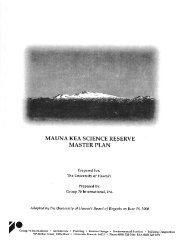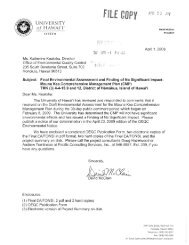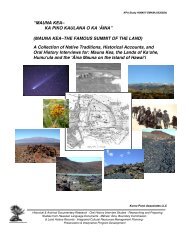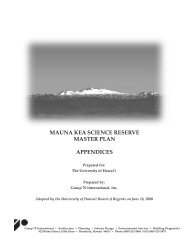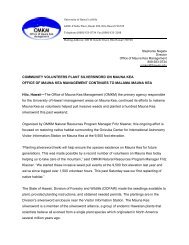- Page 1 and 2:
KPA Study HiMK67-OMKM (Appendix A-0
- Page 3 and 4:
Cover Photos Hisa Kimura and compan
- Page 5 and 6:
George Kinoulu Kahananui, Sr. Recol
- Page 7 and 8:
INTRODUCTION This collection of ora
- Page 9 and 10:
Interview Methodology Oral history
- Page 11 and 12:
Table 1. Background of Primary Inte
- Page 13 and 14:
Table 1. Background of Primary Inte
- Page 15 and 16:
MAUNA KEA ME KA ‘ÄINA MAUNA I KA
- Page 17 and 18:
RG: KM: RG: KM: RG: KM: RG: KM: RG:
- Page 19 and 20:
KM: ‘Ae. RG: Not the hill but Pu
- Page 21 and 22:
RG: KM: RG: KM: RG: PG: KM: RG: PG:
- Page 23 and 24:
RG: KM: RG: KM: RG: KM: RG: KM: RG:
- Page 25 and 26:
PG: KM: RG: KM: PG: RG: KM: PG: KM:
- Page 27 and 28:
KM: RG: PG: KM: PG: KM: PG: KM: PG:
- Page 29 and 30:
RG: That’s what I understand. Rai
- Page 31 and 32:
KM: ‘Ae. RG: Maybe a thousand or
- Page 33 and 34:
PG: KM: PG: RG: PG: RG: PG: KM: RG:
- Page 35 and 36:
KM: We went up with him about… PG
- Page 37 and 38:
KM: RG: KM: RG: KM: RG: KM: RG: KM:
- Page 39 and 40:
KM: It’s clear that if that was t
- Page 41 and 42:
RG: KM: PG: KM: PG: KM: PG: KM: PG:
- Page 43 and 44:
KM: One of the really intriguing th
- Page 45 and 46:
RG: Yes. KM: You never heard anythi
- Page 47 and 48:
Mauka Wall of Trap for Mauna Kea Ca
- Page 49 and 50:
RG: KM: RG: KM: RG: KM: RG: KM: RG:
- Page 51 and 52:
RG: KM: PG: RG: PG: RG: PG: KM: PG:
- Page 53 and 54:
KM: PG: KM: PG: KM: RG: KM: RG: PG:
- Page 55 and 56:
KM: Do you have any idea about how
- Page 57 and 58:
KM: RG: PG: RG: KM: RG: KM: RG: KM:
- Page 59 and 60:
PG: KM: RG: KM: PG: KM: PG: KM: RG:
- Page 61 and 62:
KM: RG: KM: RG: KM: RG: KM: RG: KM:
- Page 63 and 64:
RG: The ranch had three intakes up
- Page 65 and 66:
Radcliffe “Rally” and Patricia
- Page 67 and 68:
RG: Yes. KM: ‘Auwë! I haven’t
- Page 69 and 70:
RG: All these cattle would go there
- Page 71 and 72:
KM: Yes. You’ll love the map that
- Page 73 and 74:
PG: I asked him when I read the boo
- Page 75 and 76:
PG: KM: PG: KM: PG: KM: PG: RG: KM:
- Page 77 and 78:
KM: Was this in the, well, the bull
- Page 79 and 80:
KM: RG: PG: KM: PG: KM: RG: KM: RG:
- Page 81 and 82:
KM: RG: KM: RG: KM: PG: KM: RG: KM:
- Page 83 and 84:
PG: RG: KM: RG: KM: RG: KM: RG: KM:
- Page 85 and 86:
RG: KM: RG: KM: RG: KM: RG: KM: RG:
- Page 87 and 88:
KM: RG: KM: RG: KM: PG: KM: RG: KM:
- Page 89 and 90:
KM: PG: KM: PG: KM: RG: KM: PG: KM:
- Page 91 and 92:
KM: You know those lines of hills,
- Page 93 and 94:
Sheep ranching operations between H
- Page 95 and 96:
KM: RG: KM: RG: KM: RG: KM: RG: KM:
- Page 97 and 98:
KM: RG: KM: RG: KM: RG: KM: PG: KM:
- Page 99 and 100:
PG: KM: PG: KM: PG: KM: PG: KM: PG:
- Page 101 and 102:
KM: PG: KM: PG: KM: RG: KM: RG: KM:
- Page 103 and 104:
RG: PG: RG: KM: RG: KM: RG: KM: PG:
- Page 105 and 106:
KM: RG: KM: RG: KM: RG: KM: PG: RG:
- Page 107 and 108:
PG: RG: RG: KM: RG: KM: RG: KM: RG:
- Page 109 and 110:
RG: KM: PG: KM: PG: KM: PG: KM: PG:
- Page 111 and 112:
RG: KM: RG: KM: RG: KM: RG: KM: RG:
- Page 113 and 114:
RG: KM: RG: KM: RG: KM: RG: KM: RG:
- Page 115 and 116:
Discusses travel to the summit regi
- Page 117 and 118:
KM: RG: PG: KM: PG: KM: RG: KM: PG:
- Page 119 and 120:
PG: Right, he was still working for
- Page 121 and 122:
PG: RG: KM: RG: KM: RG: KM: RG: KM:
- Page 123 and 124:
RG: PG: KM: PG: KM: RG: KM: RG: KM:
- Page 125 and 126:
KM: RG: KM: RG: KM: RG: KM: RG: KM:
- Page 127 and 128:
KM: PG: KM: PG: RG: PG: RG: KM: RG:
- Page 129 and 130:
Theodore “Teddy” Bell Recollect
- Page 131 and 132:
TB: When are you folks pau, Robby R
- Page 133 and 134:
TB: No, this pampas came in when…
- Page 135 and 136:
RH: TB: RH: TB: RH: KM: TB: RH: TB:
- Page 137 and 138:
TB: KM: TB: KM: TB: KM: TB: KM: TB:
- Page 139 and 140:
KM: Now, uncle, do you know where t
- Page 141 and 142:
TB: Pu‘u, Pu‘ukalani. RH: Pu‘
- Page 143 and 144:
TB: KM: TB: KM: TB: KM: TB: KM: TB:
- Page 145 and 146:
KM: TB: KM: TB: KM: TB: KM: TB: RH:
- Page 147 and 148:
KM: TB: KM: TB: KM: TB: KM: TB: KM:
- Page 149 and 150:
Remains of possible house enclosure
- Page 151 and 152:
TB: KM: TB: [chuckles] Too many hil
- Page 153 and 154:
TB: RH: TB: US: RH: TB: RH: TB: RH:
- Page 155 and 156:
KM: RH: KM: RH: TB: RH: KM: TB: RH:
- Page 157 and 158:
TB: RH: KM: RH: KM: RH: TB: RH: Gro
- Page 159 and 160:
RH: KM: RH: KM: TB: KM: TB: KM: TB:
- Page 161 and 162:
RH: KM: RH: KM: RH: KM: ES: RH: ES:
- Page 163 and 164:
ES: RH: ES: RH: ES: RH: ES: RH: ES:
- Page 165 and 166:
RH: KM: RH: KM: TB: RH: TB: KM: RH:
- Page 167 and 168:
KM: So, 6.7 was where we cut up to
- Page 169 and 170:
ES: Teddy, to my knowledge the gors
- Page 171 and 172:
RH: KM: RH: ES: RH: ES: RH: KM: RH:
- Page 173 and 174:
ES: The major influence would be th
- Page 175 and 176:
KM: TB: RH/KM: KM: TB: KM: RH: Ahh.
- Page 177 and 178:
KL: Then my father retired, and he
- Page 179 and 180:
KM: KL: KM: KL: KM: KL: KM: KL: KM:
- Page 181 and 182:
KM: KL: KM: KL: KM: KL: KM: KL: KM:
- Page 183 and 184:
KM: KL: KM: KL: KM: KL: KM: KL: KM:
- Page 185 and 186:
KL: KM: KL: KM: KL: KM: KL: KM: KL:
- Page 187 and 188:
KL: Humu‘ula. KM: If we’re…le
- Page 189 and 190:
KL: Yes, they only like money, mone
- Page 191 and 192:
KL: Oh, yeah. I know where that pla
- Page 193 and 194:
KL: KM: KL: KM: KL: KM: KL: KM: KL:
- Page 195 and 196:
KL: KM: KL: KM: KL: KM: KL: KM: KL:
- Page 197 and 198:
KL: KM: KL: KM: KL: KM: KL: KM: KL:
- Page 199 and 200:
KM: KL: KM: KL: KM: KL: KM: KL: KM:
- Page 201 and 202:
KM: KL: KM: KL: KM: KL: KM: KL: KM:
- Page 203 and 204:
KL: KM: KL: KM: KL: KM: KL: KM: KL:
- Page 205 and 206:
KL: KM: KL: KM: KL: KM: KL: KM: KL:
- Page 207 and 208:
Looking at a photo album with photo
- Page 209 and 210:
KM: At that time. HK: He moved to W
- Page 211 and 212:
KM: HK: KM: HK: KM: HK: KM: HK: KM:
- Page 213 and 214:
EK: KM: EK: KM: HK: KM: HK: KM: EK:
- Page 215 and 216:
KM: Beautiful! EK: Somebody wrote t
- Page 217 and 218:
KM: But you know, you go from Kuka
- Page 219 and 220:
HK: Timber line. That’s the end o
- Page 221 and 222:
HK: KM: HK: KM: HK: KM: HK: KM: HK:
- Page 223 and 224:
KM: EK: HK: KM: EK: Group: EK: KM:
- Page 225 and 226:
KM: EK: KM: EK: KM: EK: KM: EK: KM:
- Page 227 and 228:
KM: EK: HK: EK: KM: EK: KM: EK: KM:
- Page 229 and 230:
KM: Not Purdy EK: No. HK: It’s no
- Page 231 and 232:
EK: KM: EK: KM: EK: KM: EK: KM: EK:
- Page 233 and 234:
KM: EK: HK: KM: HK: KM: HK: KM: EK:
- Page 235 and 236:
KM: HK: KM: HK: KM: HK: KM: HK: EK:
- Page 237 and 238:
HK: It was not that difficult to co
- Page 239 and 240:
HK: EK: HK: KM: HK: KM: EK: KM: EK:
- Page 241 and 242:
HK: KM: HK: EK: HK: KM: EH/HK: KM:
- Page 243 and 244:
HK: Yes. Makahälau and the old dai
- Page 245 and 246:
HK: KM: HK: KM: HK: KM: HK: KM: HK:
- Page 247 and 248:
HK: KM: HK: KM: HK: KM: HK: EK: KM:
- Page 249 and 250:
KM: HK: EK: HK: KM: HK: KM: HK: KM:
- Page 251 and 252:
EK: KM: HK: KM: EK: HK: KM: HK: KM:
- Page 253 and 254:
KM: HK: KM: HK: KM: EK: KM: EK: HK:
- Page 255 and 256:
KM: HK: KM: HK: KM: HK: KM: HK: HK:
- Page 257 and 258:
KM: HK: EK: HK: EK: HK: KM: HK: KM:
- Page 259 and 260:
Mark both expressed concern about t
- Page 261 and 262:
KM: JY: KM: JY: KM: JY: KM: JY: KM:
- Page 263 and 264:
JY: KM: JY: KM: JY: KM: JY: KM: JY:
- Page 265 and 266:
JY: It went out on the side [indica
- Page 267 and 268:
KM: JY: KM: JY: KM: JY: KM: JY: KM:
- Page 269 and 270:
JY: KM: JY: KM: JY: KM: JY: KM: JY:
- Page 271 and 272:
JY: KM: JY: KM: JY: KM: JY: KM: JY:
- Page 273 and 274:
JY: KM: JY: KM: JY: KM: JY: KM: JY:
- Page 275 and 276:
KM: For real JY: Yes. KM: Had Germa
- Page 277 and 278:
KM: JY: KM: JY: KM: JY: KM: JY: KM:
- Page 279 and 280:
JY: KM: JY: KM: JY: KM: JY: KM: JY:
- Page 281 and 282:
Theodore “Teddy” Bell Recollect
- Page 283 and 284:
KM: TB: KM: TB: KM: TB: KM: TB: KM:
- Page 285 and 286:
KM: TB: KM: TB: KM: TB: KM: TB: KM:
- Page 287 and 288:
KM: TB: KM: TB: KM: TB: KM: TB: KM:
- Page 289 and 290:
KM: TB: KM: TB: KM: TB: KM: TB: KM:
- Page 291 and 292:
TB: Yes. KM: Across here, that’s
- Page 293 and 294:
TB: KM: TB: KM: TB: KM: TB: KM: TB:
- Page 295 and 296:
KM: TB: KM: TB: KM: TB: KM: TB: KM:
- Page 297 and 298:
KM: Yes. If you think about when th
- Page 299 and 300:
TB: KM: TB: KM: TB: KM: TB: KM: TB:
- Page 301 and 302:
TB: KM: TB: KM: TB: KM: TB: KM: TB:
- Page 303 and 304:
KM: TB: KM: TB: KM: TB: KM: TB: KM:
- Page 305 and 306:
KM: Okay. What do you think about M
- Page 307 and 308:
TB: KM: TB: KM: TB: KM: TB: KM: TB:
- Page 309 and 310:
TB: KM: TB: KM: TB: KM: TB: KM: TB:
- Page 311 and 312:
KM: The clouds lifting up. TB: Yes,
- Page 313 and 314:
KM: TB: KM: TB: KM: TB: KM: TB: KM:
- Page 315 and 316:
KM: TB: KM: TB: KM: TB: KM: TB: KM:
- Page 317 and 318:
George Kinoulu Kahananui, Sr. Recol
- Page 319 and 320:
KK: KM: KK: KM: KK: KM: KK: KM: KK:
- Page 321 and 322:
KM: How did you end up being in Kap
- Page 323 and 324:
was also a Professor for Zoology wi
- Page 325 and 326:
KM: DW: KM: DW: KM: DW: KM: DW: KM:
- Page 327 and 328:
DW: KM: DW: KM: DW: KM: DW: KM: UW:
- Page 329 and 330:
KM: DW: KM: DW: That’s correct. I
- Page 331 and 332:
DW: KM: DW: KM: DW: KM: DW: KM: DW:
- Page 333 and 334:
DW: KM: DW: KM: DW: KM: DW: KM: DW:
- Page 335 and 336:
DW: They were all up there, all ove
- Page 337 and 338:
KM: Yes, interesting. Even if I can
- Page 339 and 340:
KM: DW: KM: DW: KM: DW: KM: DW: KM:
- Page 341 and 342:
DW: [looking up the mountain landsc
- Page 343 and 344:
KM: DW: KM: DW: KM: DW: KM: DW: KM:
- Page 345 and 346:
KM: LW: DW: KM: DW: KM: DW: KM: DW:
- Page 347 and 348:
DW: Yes, he was about the best obse
- Page 349 and 350:
1951, the Territory was getting twe
- Page 351 and 352:
DW: KM: DW: KM: DW: KM: DW: KM: DW:
- Page 353 and 354:
DW: KM: DW: KM: DW: KM: DW: KM: DW:
- Page 355 and 356:
KM: Right here, here’s this fence
- Page 357 and 358:
KM: DW: KM: DW: UW: DW: UW: KM: DW:
- Page 359 and 360:
KM: DW: KM: DW: KM: DW: KM: DW: KM:
- Page 361 and 362:
UW: DW: KM: DW: KM: DW: KM: DW: KM:
- Page 363 and 364:
KM: DW: UW: DW: KM: DW: KM: DW: KM:
- Page 365 and 366:
DW: KM: DW: KM: DW: KM: DW: KM: DW:
- Page 367 and 368:
AhFat and Barbara Lee Recollections
- Page 369 and 370:
KM: In Kohala AL: In Kohala, yes. K
- Page 371 and 372:
AL: More like how Hawaiians call th
- Page 373 and 374:
KM: AL: KM: AL: KM: AL: KM: AL: KM:
- Page 375 and 376:
AL: KM: AL: KM: AL: KM: AL: BL: AL:
- Page 377 and 378:
KM: AL: KM: AL: KM: AL: KM: AL: KM:
- Page 379 and 380:
AL: Until I came back to work for W
- Page 381 and 382:
AL: BL: KM: BL: KM: AL: KM: AL: KM:
- Page 383 and 384:
KM: BL: KM: BL: KM: BL: KM: BL: KM:
- Page 385 and 386:
KM: Okay, okay. Well, thank you. Ma
- Page 387 and 388:
AL: KM: BL: KM: BL: KM: BL: KM: AL:
- Page 389 and 390:
KM: BL: KM: AL: KM: AL: KM: AL: KM:
- Page 391 and 392:
AhFat Lee Recollections of Waiki‘
- Page 393 and 394:
AL: KM: AL: KM: AL: KM: AL: KM: AL:
- Page 395 and 396:
KM: Tell me what happened, you said
- Page 397 and 398:
AL: KM: AL: KM: AL: KM: AL: KM: You
- Page 399 and 400:
Never heard anyone talk about a hei
- Page 401 and 402:
AL: And then one more there [thinki
- Page 403 and 404:
Reserve [HTS Plat 613]. But what yo
- Page 405 and 406:
went to the mountain, “I used to
- Page 407 and 408:
KM: AL: KM: AL: KM: AL: KM: AL: KM:
- Page 409 and 410:
KM: AL: KM: AL: KM: AL: KM: AL: KM:
- Page 411 and 412:
KM: AL: KM: AL: KM: AL: KM: AL: KM:
- Page 413 and 414:
AL: KM: AL: KM: AL: KM: AL: KM: AL:
- Page 415 and 416:
KM: Yes. You got to water them ever
- Page 417 and 418:
KM: Your stock was more diverse tha
- Page 419 and 420:
KM: You know, evidently the old Haw
- Page 421 and 422:
AL: KM: AL: KM: AL: KM: AL: KM: AL:
- Page 423 and 424:
KM: AL: KM: AL: KM: AL: KM: AL: KM:
- Page 425 and 426:
KM: AL: KM: AL: KM: AL: KM: AL: KM:
- Page 427 and 428:
Jess Hannah and Barbara Phillips-Ro
- Page 429 and 430:
JH: KM: JH: KM: JH: KM: JH: KM: JH:
- Page 431 and 432:
dead. I used to tell the sergeant,
- Page 433 and 434:
KM: JH: KM: JH: KM: JH: KM: BR: JH:
- Page 435 and 436:
KM: Yes. You think in around ‘33
- Page 437 and 438:
KM: Yes. JH: “Water, if there ain
- Page 439 and 440:
BR: Yes. That’s about right. KM:
- Page 441 and 442:
JH: KM: JH: KM: JH: KM: JH: KM: JH:
- Page 443 and 444:
JH: KM: JH: KM: JH: KM: JH: KM: JH:
- Page 445 and 446:
JH: KM: JH: BR: JH: KM: JH: KM: JH:
- Page 447 and 448:
JH: KM: JH: KM: JH: KM: JH: BR: KM:
- Page 449 and 450:
JH: KM: JH: KM: JH: KM: BR: JH: BR:
- Page 451 and 452:
JH: BR: KM: BR: JH: BR: JH: BR: KM:
- Page 453 and 454:
KM: JH: KM: JH: KM: BR: KM: JH: Or
- Page 455 and 456:
KM: JH: KM: JH: KM: JH: KM: Yes, to
- Page 457 and 458:
BR: Lono. JH: The old man, he used
- Page 459 and 460:
JH: Other guys, cut the legs off, t
- Page 461 and 462:
JH: KM: JH: KM: JH: KM: JH: KM: JH:
- Page 463 and 464:
KM: JH: BR: JH: BR: JH: BR: JH: KM:
- Page 465 and 466:
JH: Plenty guys bought ‘um. If yo
- Page 467 and 468:
KM: BR: JH: KM: JH: KM: JH: BR: JH:
- Page 469 and 470:
Hisao Kimura Recollections of the
- Page 471 and 472:
HK: KM: HK: KM: HK: KM: HK: KM: HK:
- Page 473 and 474:
HK: You can see how the soil, I gue
- Page 475 and 476:
HK: KM: HK: KM: HK: KM: HK: KM: HK:
- Page 477 and 478:
HK: KM: HK: KM: HK: KM: HK: KM: HK:
- Page 479 and 480:
KM: HK: KM: HK: KM: HK: KM: HK: KM:
- Page 481 and 482:
KM: HK: KM: HK: KM: HK: KM: HK: KM:
- Page 483 and 484:
HK: Yes. They worked on a contract
- Page 485 and 486:
KM: HK: KM: HK: KM: HK: KM: HK: KM:
- Page 487 and 488:
KM: HK: KM: HK: KM: HK: KM: HK: KM:
- Page 489 and 490:
HK: KM: HK: KM: HK: KM: HK: KM: HK:
- Page 491 and 492:
KM: HK: KM: HK: KM: HK: KM: HK: KM:
- Page 493 and 494:
HK: KM: HK: KM: HK: KM: HK: KM: HK:
- Page 495 and 496:
HK: KM: HK: KM: HK: KM: HK: KM: HK:
- Page 497 and 498:
KM: HK: KM: HK: KM: HK: KM: HK: KM:
- Page 499 and 500:
Another important thing that Alfred
- Page 501 and 502:
HK: Yes, it could be. It crossed th
- Page 503 and 504:
KM: HK: KM: HK: KM: HK: KM: HK: KM:
- Page 505 and 506:
KM: Yes. You never saw any old Hawa
- Page 507 and 508:
HK: Yes. Right down here we got a g
- Page 509 and 510:
KM: HK: KM: HK: KM: HK: KM: HK: KM:
- Page 511 and 512:
KM: HK: KM: HK: KM: HK: KM: HK: KM:
- Page 513 and 514:
KM: Sorghum HK: Sorghum, yeah. KM:
- Page 515 and 516:
KM: HK: KM: HK: KM: HK: KM: HK: KM:
- Page 517 and 518:
HK: KM: HK: KM: HK: KM: HK: KM: HK:
- Page 519 and 520:
KM: HK: KM: HK: KM: HK: KM: HK: KM:
- Page 521 and 522:
Recollections of the ‘Äina Mauna
- Page 523 and 524:
KM: I think in talking with Rally,
- Page 525 and 526:
PG: Yes. It was in Reverend Ellis
- Page 527 and 528:
KM: EK: KM: EK: KM: EK: KM: EK: KM:
- Page 529 and 530:
KM: But you see on the 29 th , that
- Page 531 and 532:
RG: And then the other areas around
- Page 533 and 534:
KM: AL: KM: AL: KM: AL: KM: AL: KM:
- Page 535 and 536:
KM: Your work with the birds and it
- Page 537 and 538:
RG: KM: PG: DN: HK: KM: HK: KM: HK:
- Page 539 and 540:
KM: HK: KM: HK: KM: RG: KM: AL: KM:
- Page 541 and 542:
DN: HK: KM: HK: KM: HK: KM: Group:
- Page 543 and 544:
HK: A lot of wild sheep. KM: Wild s
- Page 545 and 546:
DN: Uh-hmm. BB: Yes. But, it’s go
- Page 547 and 548:
KM: DN: KM: BR: KM: BR: KM: Group:
- Page 549 and 550:
DN/BR: DN: BB: DN: KM: Group: KM: K
- Page 551 and 552:
KM: HK: Group: RG: HK: Group: KM: H
- Page 553 and 554:
RG: KM: PG: KM: RG: KM: HK: KM: HK:
- Page 555 and 556: HK: KM: HK: KM: EK: KM: HK: KM: HK:
- Page 557 and 558: Jiro and Mark Yamaguchi Ranching on
- Page 559 and 560: JY: See, he got to block the place
- Page 561 and 562: KM: All out that side. So the Ke‘
- Page 563 and 564: KM: JY: KM: JY: KM: JY: KM: JY: KM:
- Page 565 and 566: KM: Hmm. Pu‘u Kauha JY: No… [la
- Page 567 and 568: KM: JY: KM: JY: KM: JY: KM: JY: KM:
- Page 569 and 570: KM: JY: KM: JY: KM: JY: KM: JY: KM:
- Page 571 and 572: KM: JY: KM: JY: KM: JY: KM: JY: KM:
- Page 573 and 574: JY: KM: JY: KM: JY: KM: JY: KM: JY:
- Page 575 and 576: KM: JY: KM: JY: KM: JY: KM: JY: KM:
- Page 577 and 578: JY: KM: KK: Well, they keep on goin
- Page 579 and 580: KM: JY: KM: JY: KM: JY: WT: KM: JY:
- Page 581 and 582: JY: KM: JY: KM: JY: KM: JY: KM: JY:
- Page 583 and 584: KM: JY: MY: KM: MY: KM: JY: KM: JY:
- Page 585 and 586: Walter Richard Steiger Recollection
- Page 587 and 588: WS: KM: WS: KM: WS: KM WS: KM: WS:
- Page 589 and 590: KM: WS: KM: WS: KM: WS: KM: WS: KM:
- Page 591 and 592: WS: No. [thinking] I guess in some
- Page 593 and 594: KM: WS: KM: WS: KM: WS: KM: WS: WS/
- Page 595 and 596: there. Then I was always interested
- Page 597 and 598: HE: KM: HE: KM: HE: KM: HE: KM: HE:
- Page 599 and 600: So then he said, “I have to go to
- Page 601 and 602: HE: KM: HE: KM: HE: KM: HE: KM: HE:
- Page 603 and 604: Did not hear about any cultural rem
- Page 605: Helene E. H. Hale Recollections of
- Page 609 and 610: KM: Yes. And in talking about Mauna
- Page 611 and 612: HH: I had no family [chuckling]. On
- Page 613 and 614: Discusses Dr. Kuiper and Chamber of
- Page 615 and 616: KM: HH: KM: HH: Yes. And so in thos
- Page 617 and 618: KM: HH: KM: HH: KM: HH: KM: HH: KM:
- Page 619 and 620: KM: HH: KM: HH: KM: HH: KM: HH: KM:
- Page 621 and 622: HH: KM: HH: KM: HH: KM: HH: KM: HH:
- Page 623 and 624: RG: KM: RG: KM: RG: KM: RG: KM: RG:
- Page 625 and 626: KM: RG: KM: RG: KM: RG: KM: RG: KM:
- Page 627 and 628: RG: LC-S: RG: LC-S: RG: LC-S: KM: L
- Page 629 and 630: Tada: KM: RG: RG: Group: RG: KM: RG
- Page 631 and 632: SG: RG: PM: Group: JG: RG: KM: RG:
- Page 633 and 634: KM: Yes. RG: As far as I’m concer
- Page 635 and 636: KM: RG: KM: RG: KM: RG: KM: RG: KM:
- Page 637 and 638: KM: RG: ‘Auwë! So okay, a year o
- Page 639 and 640: RG: KM: RG: KM: RG: KM: RG: KM: Gro
- Page 641 and 642: KM: RG: KM: RG: KM: RG: KM: PM: KM:
- Page 643 and 644: RG: KM: RG: KM: RG: KM: RG: PM: RG:
- Page 645 and 646: RG: JG: RG: JG: RG: JG: RG: JG: Gro
- Page 647 and 648: KM: RG: KM: RG: KM: RG: KM: RG: KM:
- Page 649 and 650: KM: RG: KM: RG: KM: RG: KM: RG: KM:
- Page 651 and 652: PM: RG: Group: RG: KM: PM: KM: PM:
- Page 653 and 654: PM: RG: LC-S: RG: PG: RG: PG: RG: G
- Page 655 and 656: KM: And I guess with the old man Ho
- Page 657 and 658:
RG: KM: Group: PG: PM: KM: PG: KM:
- Page 659 and 660:
PG: RG: PG: PG: KM: PG: KM: PG: KM:
- Page 661 and 662:
PG: I hate that bike riding and tea
- Page 663 and 664:
RG: KM: RG: PG/KM: KM: PM: RG: KM:
- Page 665 and 666:
PG: KM: PG: KM: PM: PG: KM: PG: KM:
- Page 667 and 668:
KM: RK: KM: RK: KM: RK: KM: RK: new
- Page 669 and 670:
That’s something I deeply believe
- Page 671 and 672:
KM: RK: KM: RK: KM: RK: KM: RK: KM:
- Page 673 and 674:
KM: RK: KM: RK: KM: RK: KM: RK: KM:
- Page 675 and 676:
KM: RK: KM: RK: KM: RK: KM: RK: KM:
- Page 677 and 678:
KM: RK: KM: RK: KM: RK: KM: RK: KM:
- Page 679:
REFERENCES CITED Maly, Kepä 1999 M



